by Valérie Urbain, Chief Executive Officer, Euroclear Bank
Euroclear's China strategy and MOU signing with CCDC
Welcome to the first of Chat With Valerie series! Through the new series, Valerie Urbain, the CEO of Euroclear Bank, will share her view on key business topics and industry trends.
In the first episode, we will look at Euroclear’s China strategy and the significance of the memorandum of understanding (MOU) Euroclear Bank signed with China Central Depository & Clearing (CCDC) in September.
Valerie: Our China strategy is fully consistent with our global strategy, which is to create an ecosystem whereby global investors have access to local assets and local issuers. By doing that, global investors can increase and diversify their investments while local issuers can source financing from global investors. That is something we are already doing in the 50 domestic markets we provide access to.
We have been watching China for many years. We absolutely support the gradual opening of the Chinese market to international investors, and we are more than happy to function as a go-between for global markets and the Chinese market. Given the size and the strategic importance of the Chinese market, we are very excited about the prospect it brings.
For us, the Chinese market underpins two main pillars of the Euroclear strategy: on one hand, expanding our global reach and the number of local markets we provide access to; on the other, the Collateral Highway, which is about offering different players new types of collateral sources in order to boost liquidity in support of increased daily business operations. The fact that the yuan is part of the IMF’s Special Drawing Rights suggests there is big potential for using Chinese securities as collateral.
Q: How does the MOU with China Central Depository & Clearing (CCDC) fit in with the Euroclear strategy?
Valerie: The MOU, at a very high level, states that Euroclear and CCDC have agreed to work towards enhancing cross-border services and eventually establishing an efficient link to support further opening of the Chinese Interbank Bond Market. This will lead to global investors having greater access to the Chinese assets, and more use of Chinese securities as eligible collateral.
Concretely, what this means is that Euroclear will be working to bring its know-how and experience to the process of creating a link between the Chinese and global markets.
When creating links, we ensure that all transactions, including financing, can be done in a framework which is safe, recognised by international investors, and aligned with international practices. The level of comfort associated with this international framework will allow not only Chinese banks but also global investors and risk managers to support their activities using Chinese securities as collateral.
Looking at the situation today, we are seeing more and more transactions requiring to be collateralised. This is largely driven by regulatory pressures, but it also reflects the changing business environment. The supply of high quality collateral can often be restricted by the inability to quickly mobilise assets from where they are held to where they are needed.
By providing global investors with access to a pool of high quality Chinese securities, we will be increasing their flexibility to collateralise exposures in the way, and with the asset type, that best suits their business needs.
Q: The Chinese bond market is the second largest in the world. Given what you say about the market challenge of moving assets from where they are held to where they are needed, how could this MOU potentially change the picture of global collateral liquidity?
Valerie: In Asia, we see Japanese government bonds being used more and more to collateralise transactions. However, US and EU securities are still the most widely used collateral assets. When people transact in the Asia Pacific markets and decide to use European or US collateral, you have a time zone difference which creates inefficiencies. By making Chinese securities eligible as collateral, it will greatly alleviate such inefficiencies. To further mitigate the effect of time zone difference and increase the velocity of the collateral, we can implement state-of-art connections between market infrastructures.
What is also interesting is that since Chinese markets are now part of the major international indices, you have a number of asset managers who need to invest in Chinese securities. However, adopting a ‘buy and hold’ strategy does not effectively optimize their asset pool.
Using Chinese securities as collateral could be a way for buy side entities who have invested in Chinese securities to optimise their return and to fulfil their own collateral obligations. Overall, it's a win-win situation for Chinese issuers, global investors, the buy side and the sell side if this huge pool of securities can be used for collateral management transactions.
Valerie: A good example would be the Uncleared Margin Rules related to OTC derivatives trading activity. Following regulatory changes, different types of entity – including the buy-side – either already have to, or will shortly need to, post initial margin.
Posting high quality securities is one of the ways firms are choosing to comply with the regulation and as the number of impacted firms increases, so does the demand for high quality collateral. Therefore any scenario that includes providing access to a very large pool of securities that can be used as collateral would certainly be valuable for the market.
Valerie: Thanks to the link with CCDC, this could certainly be possible. To make it work though, you would need certain things to be in place.
First, you would need a link to be established with CCDC to make the securities eligible in Europe. Then, you would need to have the legal framework agreed between the different parties that meets the expectations of the international markets and investors.
So yes, it is certainly possible that Chinese assets will become eligible, but there is still some dialogue and development that needs to take place before this happens.
And this is what the MOU with CCDC is all about.




